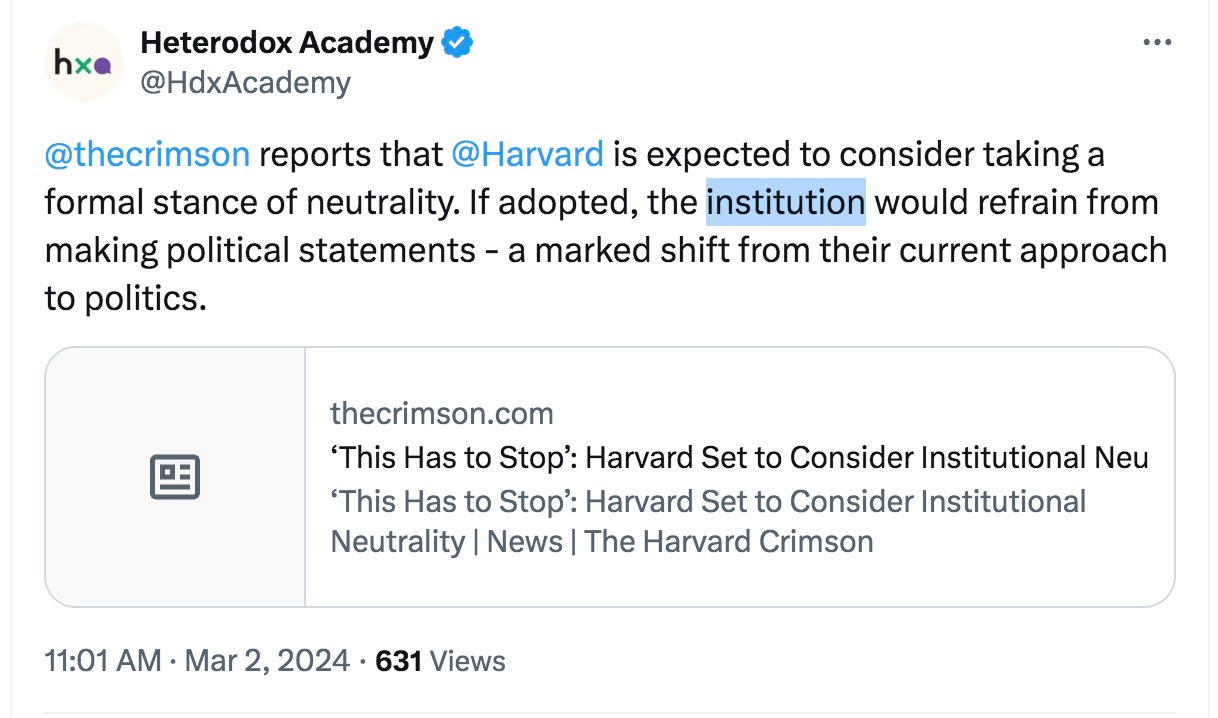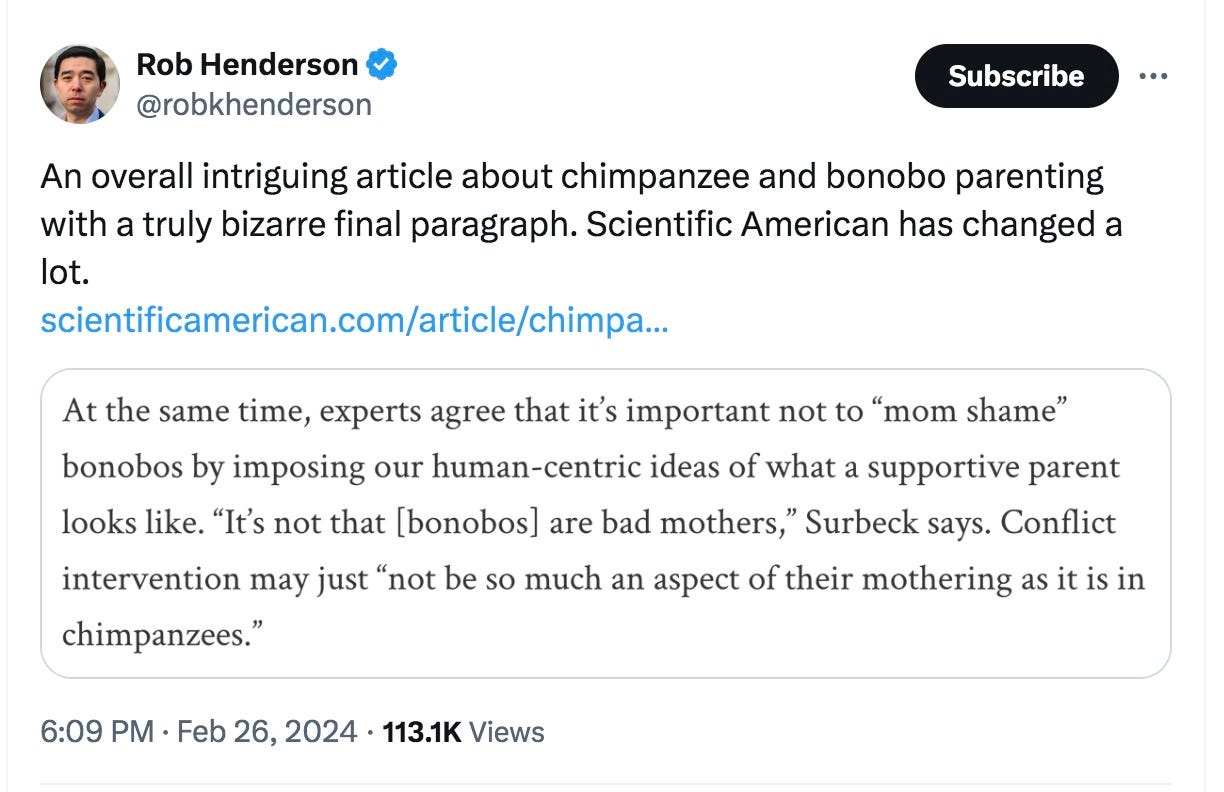E-Pluribus | March 4, 2024
The constitution under progressive fire; a cause worth living for, and dying for; and polarization and... economics?
A round-up of the latest and best musings on the rise of illiberalism in the public discourse:
Mary Harrington: Progressive attacks on the US constitution escalate
Today the Supreme Court unanimously confirmed the authority of the Constitution in its decision in Trump v. Anderson, the Colorado case that sought to remove Trump from the 2024 ballot in that state for his January 6th actions. While not addressing that case specifically, Mary Harrington at UnHerd says attacks on the Constitution are all too frequent, and that progressives are not innocent when it comes to undermining this bedrock document.
. . .There, a growing chorus of progressive voices now critiques the American Constitution itself as an impediment to American values. McQuade isn’t the first: just a few days earlier, Politico’s Heidi Przybyla framed perhaps the central premise of post-revolutionary America — that individual rights are divinely given — as not a sacred foundational principle so much as a political manoeuvre by the progressive world’s new bogeyman, so-called “Christian nationalism”.
Never mind that the “inalienable rights” to which men are, in the Declaration of Independence, entitled, are described there as having been “endowed by their Creator”: “Nature and Nature’s God”. For Przybyla, the fact that it falls to fallible humans to interpret those divine givens means this supposed origin is critically vulnerable to weaponisation by malign (that is, conservative) forces.
American culture is revolutionary by design, and structurally opposed to the kind of demographic homogeneity that might support a stable unwritten constitution over the long term. It was thus always predisposed to support radical rewritings even over a relatively short national lifespan as America to date. Indeed, if critics such as Christopher Caldwell are correct, such a transformation already took place in 1964, when the Civil Rights Act was passed.
Read the whole thing.
Martin Gurri: Alexei Navalny and the Transcendence of Courage
It’s easy to throw around words like “courage” and “martyr” in our political fights here at home, but sometimes we must look beyond our borders for more stark examples. At City Journal, Martin Gurri draws our attention to the cause Alexei Navalny paid the ultimate price to defend, and how it should sharpen our focus on what is truly worthwhile.
French revolutionaries coined the word “terrorism” to mark the amount of government-induced fear needed to subdue the population. It worked quite effectively then, and it works still. But the method has a vulnerability: the fearless individual. Fearlessness in the face of mortal threat is an extremely rare quality, possessed by one in a million people, but it’s also contagious. The example of that one courageous person restores the humanity of others, who recall, with shame, that they, too, have a will and voice of their own. Once fear is lost, tyranny collapses. Speaking to the multitudes in his native Poland, Pope John Paul II began the dissolution of the Communist empire with three words: “Be not afraid.”
Alexei Navalny, Russia’s leading opposition figure, died under suspicious circumstances on February 16 in an Arctic prison camp that serves as a useful reminder of Soviet brutality. His was a death foretold. In fact, he had been murdered once before. As a blogger and social media activist, and later as a politician, he had been relentless in his opposition to the regime: he spoke of the “virus of freedom,” of which he was a carrier. Vladimir Putin, Russia’s supreme hit man, simply could not run the risk of contagion. He had Navalny secretly exposed to a lethal nerve agent, Novichok—another handy legacy of Soviet criminality.
[. . .]
After the poisoning, Navalny was together with his wife and family in the relative safety in a free country. He had done more than his duty, offering up his life to Russia and to freedom. Who among us wouldn’t have seized the chance to enjoy a bit of peace and normality? But that is the mystery of people of great courage: they exist almost symbolically, in the realm of myth. Navalny never considered becoming a permanent exile. Some compulsive sense of who he was drew him to his second death. During the months spent outside Russia, a CNN documentary, Navalny, made him known to a global audience. His growing fame clearly irritated Putin, who referred to him as “the Berlin patient,” as if afraid to say his name. There was no question about what would happen to him once he returned.
In one sense, Navalny was a rebel of the digital age. His politics were mutable and confused, but he knew with total clarity what he stood against. From a broader perspective, however, he can be said to descend from a long and venerable line of Russian “dissidents”—people like Andrei Sakharov, Natan Sharansky, Alexander Solzhenitsyn, and the mostly forgotten victims of tyranny chronicled in Solzhenitsyn’s Gulag Archipelago, who suffered and died to retain a shred of decency in their society. Russia, a synonym for despotism, historically misgoverned, has been one of the world’s leading producers of political heroism—but unhappy the nation that needs, and wastes, the lives of so many heroes to balance its shame.
We in the U.S. suffer from the opposite condition. Our lives are soft and easy, but we are lacking in courage. We move in great conformist herds, terrified that a single original thought might knock us out of step and reveal us to the world, in all our appalling helplessness, as individuals. We are told by tribal elders which words to use and which are taboo—these change constantly, since it’s a training regime in obedience. We are afraid of the Internet mob. We are afraid of getting cancelled and losing our jobs. The youngest adult Americans are afraid of sex and of each other and of life itself.
Read it all here.
Ben Klutsey & Daniel Stone: Polarization and Behavioral Economics
At Discourse Magazine, Ben Klutsey continues his series on liberalism, to which Pluribus has often linked in the past. In this installment, Klutsey interviews Bowdoin College associate professor of economics Daniel Stone about how today’s politically polarized environment can even impact the relatively mundane (no offense intended) field of economics. A short excerpt is below.
[BEN] KLUTSEY: Now, we’ll get right into it. When it comes to analyzing the issue of polarization, what do economists bring to the table in helping us understand the nature of polarization? What’s different that economics brings to the table that other disciplines don’t necessarily bring?
[DANIEL] STONE: Sure. I think what we bring, and what I’ve tried to bring, is—obviously, we tend to focus on quantitative analysis, and we quantify things. For better or for worse, that’s the nature of our discipline. I think a benefit of this can be that it allows us to make certain statements with precision that we couldn’t otherwise.
What I try to do in the book is argue that something like even interpersonal feelings, which even behavioral economists in the past haven’t really thought this is something that economics had much to say about, that it could really tackle. I argue that actually our feelings—I wouldn’t say that our feelings could be quantified, per se, but our feelings can actually be wrong in an objective sense because our feelings are ultimately, to a large extent, based on beliefs that we have about the type of people that we’re holding those feelings toward. Specifically, beliefs about who they are, meaning the actions that they take, that they’ve taken in the past, that they will take in the future; the opinions they hold. These are the things that result from the character traits that drive our feelings.
Because these beliefs can ultimately be right or wrong to different degrees. For example—an example I talk about in the book, a simple example might be a belief that I hold about, say, the amount of money you donate to charity or your probability of donating to charity if I were to ask you to donate. In terms of just actual amount of money, there’s a certain amount that you give. If I overestimate that and I like people that give a lot, I might actually like you more than I should. If I underestimate, I like you less than I should.
It goes well beyond charity. In general, our feelings are driven by our beliefs about various actions we think people are going to take. Even if I have no idea what actions are important to you or what actions you use as a basis for forming your feelings, whatever your criteria are for your feelings, your beliefs may or may not be accurate about the types of actions other people are going to take. Therefore, your feelings could actually be mistaken.
KLUTSEY: I think you’re touching on something that you spend a lot of time on in the book, talking about specifically “biased dislike.” I’d love for you to elaborate on what that is and how biased dislike relates to something like affective polarization bias.
STONE: Yes. The first point is that, OK, if I like people that donate to charity and I underestimate how much you give, I’ll dislike you too much. Then I acknowledge that it’s possible: What if I just happen to catch you on a bad day, and you didn’t donate the one day I happen to have an eye on you? Given that you didn’t donate once, it might be reasonable or rational for me to infer you’re not much of a donor.
If I don’t like you as a result of the very limited data I have, I wouldn’t be irrational per se; I would just have some misleading data. But it’s also possible that I overreacted to this very limited data. Maybe I saw you get the chance to donate once, and anyone can have a bad day and just say, “I don’t feel like donating”: I’m not in a good mood, or maybe I’m strapped for cash today, or for whatever reason you don’t donate.
Read it all.
Around Twitter (X)
Via Heterodox Academy, Harvard University’s The Crimson is reporting that the school is ready to consider adopting institutional neutrality on political issues:
Has the transgender movement killed girls sports? Hard to think of another reason for such a threatened action:
And finally, via Rob Henderson, Scientific American addresses a burning issue apparently roiling the scientific community: mom-shaming…bonobos.









